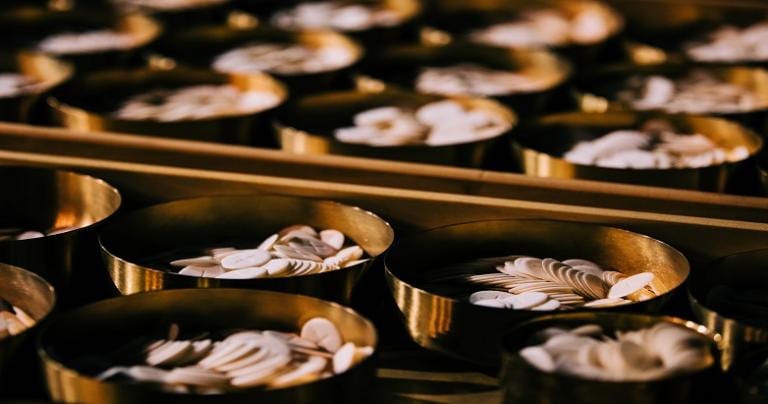
Sacrilege should never happen, but sometimes it does, and it can even be the occasion for self-discovery.
Sacrilege comes in many shapes and sizes. The Universal Catechism (CCC 2120) defines sacrilege here—
Sacrilege consists in profaning or treating unworthily the sacraments and other liturgical actions, as well as persons, things, or places consecrated to God. Sacrilege is a grave sin especially when committed against the Eucharist, for in this sacrament the true Body of Christ is made substantially present for us.
Let’s consider sacrilege in light of theology. Theology is that chief outcome of faith by which we critically reflect on faith. We Catholics ought to hold theology sacred. All Church teaching is comprised of various theologies. There is no Catholic doctrinal or dogmatic formula we possess that is not theological in essence, or could even exist without prior theologizing. We Catholics believe that faith is consonant with reason (the First Vatican Council’s Dogmatic Constitution on the Catholic Faith, chapter 4). Considering the Catechism’s definition above, I wonder if we might call “sacrilege” any unworthy treatment of the sacredness inherent to all that?
Sacrilege of Duty
“Keep It Simple, Stupid!” keeps them stupid, simply. If the Church teaches something officially, and the people by and large misunderstand and distort that teaching, what should be done? “Church” (as Yves Congar wisely taught us) to most means the shepherding authority of the church (i.e., the magisterium). Shouldn’t the shepherding authority own up to some responsibility and stop thinking of itself as a societas perfectas and other such nonsense? Where does the buck stop?
Catholics and other Christians believe many things, some good, some bad, and yes, some ugly. We often pool much ignorance. Go to your average Catholic and ask him what is the Church’s official teaching on the Trinity. You’ll often get tritheism and modalism. Same thing with your average Christian of whatever stripe. Ask most about the teaching on the incarnation. You’ll get Docetism, Monophysitism, and Monothelitism, galore.
Subtle Theology
I am grateful to an old friend and mentor for the theological challenge of this post. Here is a true story that I learned of recently from this brother and gentleman, without whom I could not have written this. The events it describes happened over ten years ago. The culprit who acted in terrible disrespect boasted to my friend about his actions. So here we go…
Storytime!
Once upon a time, not too long ago, a university employee and graduate student (who now happens to be a high-ranking member of the Southern Baptist convention) attended Mass at a nearby Catholic parish. I should say that this person was energetically anti-Catholic. He had entered the liturgy with the sole purpose of obtaining a consecrated Host for a special purpose, and not that of the Church.
It was toward the end of mass when this fellow entered the church. He quietly got into a communion line. Once in front of the Extraordinary Minister of Communion, he received the Host on the tongue as he had watched people do on EWTN many times. Then, without swallowing, he quickly exited and got into his car.
From the glove compartment he took out a prepared Ziploc bag and spit the Host into it. He sealed the bag. A Biology major (and Creationist besides!), he drove to the university, and placed the semi-dissolved Host on a Petri dish. He next began to observe the material through a microscope. His preconceived idea was confirmed: it was carbohydrates only.
In triumphalist bombast, the next day he celebrated his sacrilege to his fellow Christian collegians. “I knew it all along!” He exclaimed, gleefully. “This disproves the false doctrine of the Real Presence! The physical substance is nothing but bread!!”
To Any Protestant Fundamentalists Reading This:
What do you think? Was the anti-Catholic right? Did he really disapprove “C” Catholic teaching?
If you asked this anti-Catholic, he would tell you that he believes that every human person has a soul. What if we extracted blood from this man and put it under a microscope? Would we rightly say that the man had no soul because clearly all we see inside him is physical matter?
This man also believes that God is sovereign and controls the universe. So what if we used a space telescope to look out deep into the cosmos? When we fail to see the face of God out there, should we conclude that God is a fantasy?
The man believes that Jesus’ Resurrection wasn’t only a bodily reality, but was physical too. And thus he believes that the Ascension was a literal space travel. When we tell him that we cannot find the Risen Jesus by space telescope, nor pinpoint his trajectory and velocity, should he repudiate Christianity?
Recall that this man, despite being a biology major, holds dearly that the planet earth and universe are only a few thousand years old. To him belief in creation means belief in Creationism. What if we used solid science to demonstrate the absurdity of that belief? Should he cease believing and become an atheist then because of the failure of his Creationist beliefs matching reality?
To Any Catholic Fundamentalist Reading This:
Having read this sad story, how do you understand the Church’s chosen adverbs—truly, really, and substantially—used to describe the Real Presence of Jesus in the Eucharist (DS 1651)? Let’s say, typical of many Catholic fundamentalists, you insist that “substance” in the Church’s teaching on the Real Presence means a physical-chemical substance. What happened then with the anti-Catholic’s experiment?
Do you believe that at the words of consecration spoken by a validly ordained priest or bishop celebrating the mass, a physical and chemical change occurs to the bread and wine? Do you believe that “Real Presence” and “transubstantiation” represent a real physical change in the host? But if that gets disproved, what then becomes of your faith?
Thomas Aquinas speaks of the possibility of Eucharistic wonders. Such wonders fascinate many. They are brought up ad nauseam every Corpus Christi in “homilies.” Aquinas says that if God wanted to manifest real physical change in the consecrated elements, God could do that. God could physically or chemically change the material structure of the Host into blood or heart tissue or the appearance of a recognizable face. But according to Aquinas, even in such wondrous cases, the blood and flesh manifested cannot be the real properties of the risen Jesus who bleeds no more.
Given all that, what becomes of your beliefs?
To Anyone Reading This:
Can’t you see that all fundamentalists are merely scratch-off atheists? Wouldn’t it be a sacrilege to go through life misusing apologetics to “prove” to metaphysical certitude your “faith”? Wouldn’t it be a sacrilege to call yourself “a believer” when you are just a rationalistic atheist? Isn’t it sacrilege to confuse faith with certitude, to distort reasonable with rational?
Fundamentalism, like most silly versions of atheism, is a rationalistic approach to faith. But faith is reasonable, not rational! Faith is reasonable to the extent that it is not absurd to believe and, indeed, it makes good sense to believe. Accepting Christ is not renunciation of the intellect! So faith is reasonable in that we can show that life in Christ is more meaningful than life without him.
But faith is not rational. This is because faith cannot be proved through reason alone. As if an unprejudiced observer, under the impact of logical arguments, would be forced to mentally assent to it, otherwise violate her own integrity. This is what many popular Catholic authors, speakers, and so-called apologists would have us accept. They present revelation and faith as achievable through reason alone, thereby making conviction into a natural act. But the Second Council of Orange condemned this position in 529 CE.












